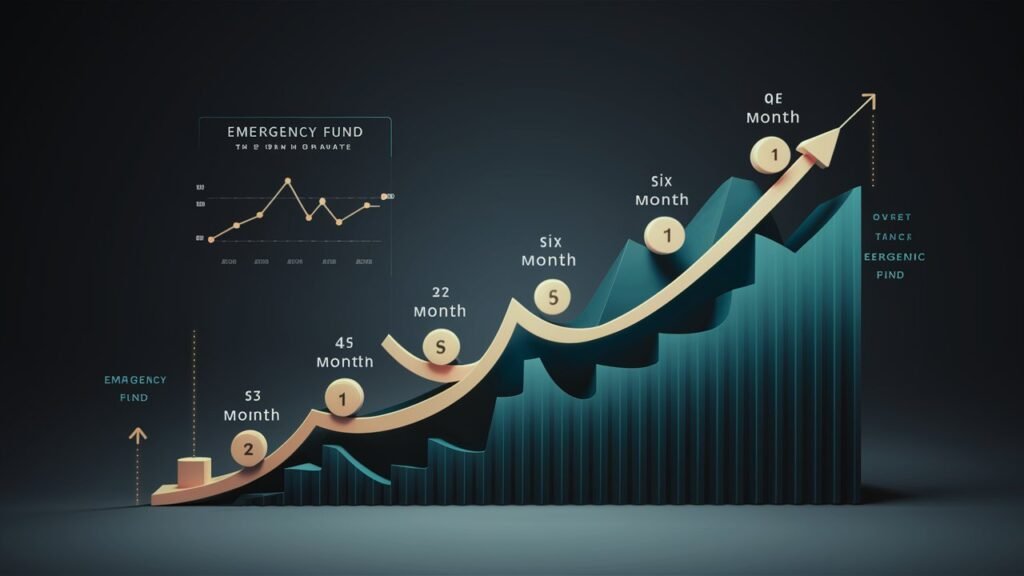Financial harmony is not just about the management of money; it is about the centeredness between earning, spending, saving, and investing to achieve one’s personal and financial goals without diminishing one’s sense of peace. It is about building a system that would support your lifestyle while ensuring long-term financial health. Therefore, when we mention the achievement of harmony, we are referring to a state of peacefulness regarding one’s financial endeavors and control over one’s finances.
Start your journey to financial harmony today! Download our free financial planning template and take the first step toward achieving your goals. Click here to get started!
Key Takeaways
- Set Clear Goals: Define specific financial objectives for better focus.
- Budget Wisely: Create a realistic budget to track income and expenses.
- Eliminate Debt: Prioritize paying off high-interest debt.
- Save Regularly: Automate savings to build financial security.
- Invest Smartly: Diversify investments to grow wealth.
- Practice Mindfulness: Align spending with your values for peace of mind.
- Plan for Retirement: Start early to ensure a comfortable future.
- Review Regularly: Monitor finances to stay on track.
1. Introduction to Financial Harmony
Thus, financial harmony can be described as the balance between earning, spending, saving, and investing in the direction of your personal and financial goals. This is about having a system that will enable you to enjoy your desired lifestyle while ensuring your long-term financial health. Financial harmony can be properly defined as the freedom from worry in connection with financial decisions, as well as the satisfaction that you have control over your financial matters.
2. What is Financial Independence?
Financial independence is described as a situation in which income generated from one’s savings and investments will help him out and will not prolong on the concept of paycheck. With this independence from financial obligations comes the ability to pursue one’s passions. Key milestones are: the establishment of an emergency fund, paying off high-interest debt, and achieving a sustainable level of passive income.
3. The Connection Between Financial Harmony and Financial Independence
While financial independence is a goal, financial harmony is a process. Harmony is setting attainable short-term goals that aim toward long-term aspirations. For example, constrained spending and diligent saving give a nice, firm foundation for attaining independence.
4. Understanding Your Relationship with Money
Your relationship with money is conditioned by personal experiences, beliefs, and habits. Think about what you believe about money:
• Do you see money as a tool or as a cause of stress?
• Are your spending habits driven by emotions?
Identify the patterns and work on developing a positive, proactive state of mind. Financial mindfulness can be your guide.

5. Creating a Plan for Financial Harmony
Begin on a budget and one which meets your actual needs. Budgeting guidelines can be any one of the ranging rules. For this case, we will go with the 50-30-20 rule:
• 50% on needs (those that need shelter, food and bills)
• 30% on wants (those that include entertainment and hobbies)
• 20% on savings and debt repayment
Thus, a budget makes a pathway in living to prioritize a conscious spending plan for resource management.
6. Building an Emergency Fund
The emergency fund is your safety net. Aim for saving enough to cover expenses for three to six months in a savings account. Set small savings goals that you can reasonably achieve and make good use of automation for your contributions to have consistency.

7. Smart Management of Debt
Debt management is critical for financial harmony. Differentiate between :
good debt (like a mortgage) and bad debt (like high-interest credit cards). Because you cannot control things, make use of snowballing or avalanche methods for starting debt repayment.
8. Making Unlimited Income Streams
Spread your income across different income sources so that you are not too dependent on a single income. Make sure to look into:
• Passive opportunities like real estate and dividends
• Freelancing or side hustling
• btaining certifications and skills for new high-paying roles
Multiple streams of income create financial security and leverage more choices.
9. Save and Invest
Saving happens to be just the beginning; investing is where your money grows. Short-term funds are best in a high-yield savings account, while long-term investments can buy into the stock market or an IRA or 401(k).
Start early so as to put the power of compounding in your favor.
10. Harmonizing Financial Goals with Life Goals
True financial running is where financial targets and personal aspirations learn to combine. Set goals into:
• Those for the short run (e.g., on vacations)
• Those for the medium run (like a car)
• Those for the long run (these mean building savings for retirement.)
Plan them in connection to time and check progress regularly.

11. Creating a Lifetime of Good Spending Habits
Conscious spending helps one to refrain from wasting money. There are a few inexpensive techniques that one can use. Some are tracking every expense using any spending app out there, setting out limits, or observing the practice on delayed gratification to avoid impulse buys.
12. Protect your Financial Resources
With growing assets, protective instincts have also come into play. Assurance of your financial interests warrants:
• Health, life, and property insurance
• Will and estate plan secured
• Robust cybersecurity measures against fraud
13. Relationship and Financial Harmony
Conflict in relationships often creeps in through money matters. To improve finance communication:
• Setting goals together as partners
• Holding regular discussions about the budget and expenses
• Agreeing upon a financial strategy that is beneficial for both

14. Learning to Financial Literacy
Being informed improves decision-making. Engage in:
• Keeping a tab on investment news
• Listening to books and podcasts from credible experts
• Taking online courses or workshops
An informed approach helps to avoid scams and maximize opportunities.
15. Minimalist role for Financial Harmony
Minimalism helps in alleviating financial woes by seeking and valuing quality overs quantity. Clean out your life by selling what you no longer need and clue yourself into “less is more.” Then aim your search for value straight through the obstacles of life.
16. Invest into Yourself
Investing in oneself is crucial for overall growth. Take steps towards educating yourself and capping it with:
• Self-education through certifications
• Fitness and health
• Networking and business development
Such small investments reap long-term rewards.
17. Track Progress in Financial Harmony
Frequent check-ins will keep you on course. You can use:
• Budget apps
• Financial dashboards
• Quarterly checking on set objectives
Celebrate your wins to stay motivated.

18. Mindfulness and Money
Mindfulness training can lead to a reduction in emotional spending. Possible techniques are:
• Keep a journal of all financial decisions made
• Remembering gratitude for what one has
• Focusing on financial intent instead of external pressures
19. Common Financial Mistakes
Be alerted to mistakes such as:
• Lifestyle inflation (spending more money as you make more)
• Retirement savings taking the backseat
• Overactive utilization of credit cards
Do give credence to others’ experiences to avoid learning their mistakes.
20.The Future of Financial Harmony
To catch up with technological and economic changes include:
• Utilizing financial management tools built on AI
• Staying investment-flexible
• Preparing economically self-sufficient assets from downturns
Plan for generational wealth to leave behind your legacy.
Conclusion
Achieving financial harmony is about creating an ever-lasting balance by overcoming consistent effort, discipline, and education. By establishing financial habits that coincide with values and goals, not just financial security but psychological security will be achieved. And that means step by step, one small goal at a time within your 20 guiding principles with clarity that will lead towards being financially fit.

FAQs About Financial Harmony
1. What is financial harmony?
Financial harmony is the balance between earning, spending, saving, and investing in a way that aligns with your personal values, goals, and lifestyle. It focuses on achieving both financial stability and peace of mind.
2. How is financial harmony different from financial independence?
Financial independence is the ability to sustain your lifestyle without relying on a paycheck, whereas financial harmony is the ongoing process of aligning financial practices with your life goals and maintaining financial peace.
3. Why is understanding my relationship with money important?
Understanding your relationship with money helps identify habits, beliefs, and emotional triggers that influence your financial decisions. A positive relationship with money can lead to better management and growth of your financial resources.
4. How do I create a financial plan?
Start by setting clear financial goals and crafting a budget using frameworks like the 50/30/20 rule. Ensure your plan addresses debt repayment, savings, and investment strategies while keeping your lifestyle needs in mind.
5. What is the role of mindfulness in financial harmony?
Mindfulness encourages intentional financial decisions by reducing emotional spending, increasing gratitude, and focusing on long-term goals. It helps maintain a healthy perspective on money.
6. How do I manage debt while achieving financial harmony?
Use methods like the snowball or avalanche strategy to pay off debts systematically. Focus on eliminating high-interest debts first while making minimum payments on others.
7. What are some ways to grow financial resources?
Diversify income streams through investments, freelancing, or passive income opportunities. Save consistently, and invest early to benefit from compound growth.
8. How can I avoid common financial pitfalls?
Stay aware of lifestyle inflation, avoid over-leveraging credit cards, and ensure regular contributions to retirement funds. Monitor your finances and adjust your strategy as needed.
9. Why is financial literacy important?
Financial literacy equips you with the knowledge to make informed decisions, avoid scams, and maximize opportunities. Continuous learning is key to staying ahead in a changing financial landscape.
10. How often should I review my financial progress?
Review your financial plans and goals quarterly or at least twice a year. Use tools like budgeting apps and financial dashboards to track progress effectively.
Transform Your Finances for a Stress-Free Future!
Unlock the secrets to mastering financial harmony. Subscribe to our newsletter for expert tips, actionable strategies, and exclusive resources delivered straight to your inbox. Join now and stay ahead!
RELATED ARTICLES
Mindful Spending Habits for Sustainable Finances
The Importance of Financial Self-Care for Stress-Free Living
Top Strategies for Mindful Debt Management and Financial Freedom
How Mindfulness Can Enhance Your Retirement Planning

